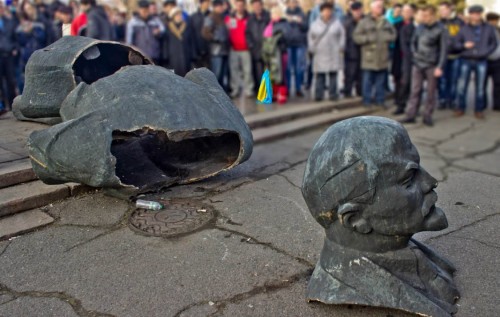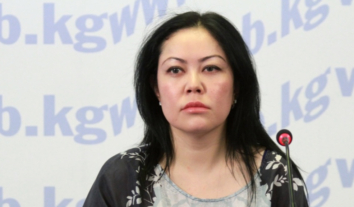Should communists be mentioned in the Basic Law? Backstage of constitutional commission
The constitutional reform is in full swing in Ukraine. The so-called de-communization is one of the controversial issues. The expert opinions are divided on this matter.
A stumbling block is a question: should the formation of the communist party and, possibly, of all the other “left-wing” parties be banned?
- “To ban the Communist Party”
The Constitutional Commission has suggested the following regulation:
“The formation of political parties and other non-governmental associations in Ukraine shall be free, except for those which profess Nazi, fascist, communist or any other totalitarian ideology in their programs or activities… The political parties or non-governmental associations cannot have the armed or paramilitary formations. The members of political parties can only be the citizens of Ukraine. Financing of political parties and non-governmental organizations shall be open.”
This regulation was drafted in view of the provision in the Polish Constitution with, perhaps, the only difference is that our Basic Law proposed a “nationalist” not “Nazi” party.
“But they said that the Parliament would not approve that because “the nationalists” is a positive term in Ukraine while “the Nazi” is a negative one,” says Vsevolod Rechytsky, the constitutional expert of the Kharkiv Human Rights Group.

However, Volodymyr Yavorsky, the human rights activist and the member of the Ukrainian Helsinki Human Rights Union, notes that this constitutional provision … does not work in Poland. In particular, the Communist Party is an officially registered organization in our neighboring country.
“The problem is that there is no definition of “Nazi, fascist, communist or any other totalitarian ideology.” That’s why it does not work in Poland and is declarative enough. The ideology cannot be defined legislatively,” Yavorsky says.
However, Poland has a fundamental point – the Communist Party does not pose a public threat there.
We should rest on the three-part test on human rights restrictions in the controversial situations.
First, restriction may be established by the law.
Second, restriction must pursue a legitimate aim.
Third, restriction must be a necessity in a democratic society.
Therefore, this test should be stipulated as a separate article in the Constitution, the human rights activist believes.
Ukrainian parties with communist ideology are dangerous to the general principles of the Constitution as the idea of the communist party is to overthrow the Constitution and reject the human rights. The communist regime does not imply human rights. It is an apparent contradiction.
But how real this danger is? This important question should be puzzled out to assess each individual situation.
Ukraine has a problem with a formal approach. If the name contains “communist” or your charter says you use the communist ideology, you will be banned.
However, if your name is, figuratively speaking, “left idea” and you make no references to any communist works, red flags or other communist symbols, you can act then, though you will actually pursue the same ideology.
Any party may be banned, but in case there is a real encroachment on constitutional values. That is why a three-part test is so important, Yavorsky says. And that’s why these parties still operate in Poland without posing any threat.
- Can all left-wing parties be banned?
Vsevolod Rechytsky, who shares American constitutional views, is convinced that any left ideology is extremely dangerous for Ukraine.
“We have completely exhausted the left resource and could teach anyone in Europe what the left is,” the expert says. He did not agree that the European standards are taken as a basis in the elaboration of the Constitution.
“Europe experiences the temptations to try leftist views, Marxism, etc… until they try it. Having such a number of victims as Ukraine has (Ukraine ranks second in Europe after the Poles in the number of people killed in fratricidal conflicts on the basis of ideological differences), we should definitely reject the left movement,” Rechytsky explains his position.
The expert also notes that the European Court of Human Rights “cannot be an authority for Ukraine” on this issue.
“Ukraine is the authority for the Court. Millions of people were killed here. People here were killed with artificial hunger. That was done by the left, the left of a wide range, not always the Stalinists. Collectivism stifles Ukraine. We need an individualistic market view,” the constitutional expert says.
- Should the organizations “which do not observe democratic principles in their activity“ be banned?
Vsevolod Rechytsky insists on this point that has not yet been entered in the draft Constitution.
The expert explains: any working party can be formed in Ukraine and given a decent title, but it will be actually a totalitarian, authoritarian party “the same as the majority of parties now in Ukraine (designed for a specific person, specific project).”
In turn, according to Yavorsky, the term “democratic principles” is estimative in fact and is not needed in the Constitution. It is also dangerous because the provisions on the “democratic principles” refer not only to political parties but to all non-governmental associations as well.
However, the fundamental principle of freedom of association gives the right to determine how the organization is administered.
So should the parties, posing threat to Ukraine, be banned or not?
The debate is ongoing.
Iryna Vyrtosu, Human Rights Information Centre, for UP
Photo credit: uainfo.org














